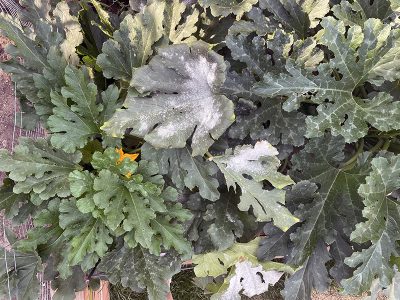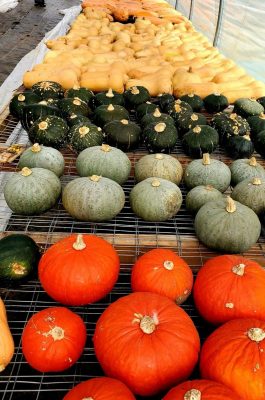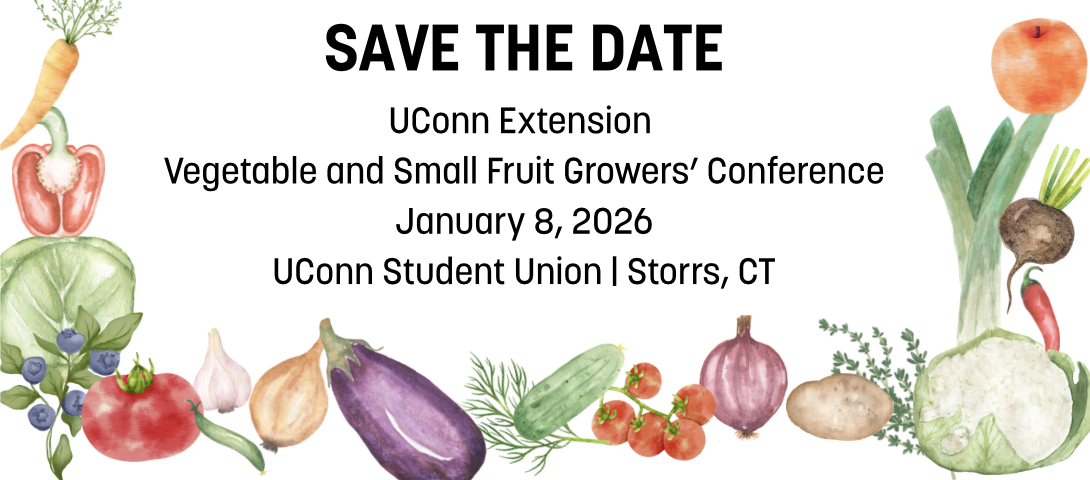What to be on the lookout for…
Cucurbit Powdery Mildew
Mid-summer summer squash plantings can sometimes yield a great final crop when conditions are right. Earlier this week we visited a farm with large summer squash plants full of blossoms and fruit that have benefited from more recent rainfall and less intense heat and sun exposure. However, being so late in the season, these plantings are still susceptible to fungal diseases which have been well established throughout the state.
Scout fields weekly once fruit has begun to form. Look for a white powdery appearance on the tops and bottoms of the leaves. Begin applying fungicides when the threshold is 1 out of 50 older leaves have symptoms on either leaf surface. Maintaining plant foliage and avoiding excessive wilting will support continued fruit health and plant production.

Winter Squash Maturity, Harvest, and Storage
Timing the winter squash harvest can sometimes be a challenge. Not only are there competing priorities, but cooler temperatures and potential diseases in the field can make even an experienced grower second guess things. For hopefully a little reassurance and guidance, check out this article from an Extension colleague, Chuck Bornt, at Cornell University. He has tips of what to keep in mind when harvesting and storing winter squash.
Read the full article here:
Winter Squash and Pumpkin Maturity, Harvesting and Storage Tips by Chuck Bornt, Cornell Cooperative Extension

Weeds going to seed - act now to prevent long-term issues!
It can be tempting to avoid spending extra hours in fields with poor crops or where you have finished harvesting. However, preventing weeds from reaching seed maturation is crucial for long-term success. Weeds like pigweed, lambsquarters, and ragweed produce large quantities of seeds that can remain viable in the soil for many years. Allowing these weeds to mature and shed seeds can lead to significant problems in the future, as the seeds contribute to the weed seed bank in the soil. Taking the time now to mow down or remove these weeds before they seed will save you considerable hours and effort in the coming years. Investing in weed control today is a proactive step toward more manageable and productive fields in the future.

End of Summer Season Reminders
- Field clean-up for pest management: At the end of the season, field clean-up and removal or soil-incorporation of crop debris are important tasks that will help reduce diseases and insect carrier over to the subsequent season. There are many pests of vegetable crops that can overwinter in New England. This article (see pages 8-9) published in a previous Crop Talk features a table describing overwintering stage and recommendations focused on cultural control of major insect pests of vegetable crops.
- Cover crops: A fundamental goal of cover cropping is to avoid bare soil between cash crop plantings. This not only protects soil, but captures sunlight and produces biomass that enhances soil quality. Other benefits include improved trafficability of fields and reduced compaction, enhance aesthetics, and potential for animal feed production. See the New England Vegetable Management Guide to get information about late summer-seeded and fall-seeded cover crops.
- Soil test: Fall is also a good time of year to perform soil tests on your fields. It provides you time to add lime if needed and be ready for spring fertilizer bulk orders. Instructions to collect soil samples and other relevant resources are available online for the Soil Nutrient Analysis Laboratory.
Sweet Corn Pests - Trap Count Update
f you have later successions of corn still growing in the field, it is a good idea to keep monitoring for pests until all generations of corn have finished milking. We noticed a slight uptick in numbers at our traps in Glastonbury this week: 13 fall armyworms, 6 corn earworms, and 3 European corn borers (hybrid). Regular trap updates and additional resources for corn pest management can be found on our website.
Biological Control Conference for Ornamental Growers
Thursday, September 18, 2025
Jones Auditorium, The Connecticut Agricultural Experiment Station,
123 Huntington Street, New Haven, CT
Rosa Raudales and Charles Krasnow from UConn's Greenhouse Extension Team are hosting a day-long workshop for ornamental growers. It will be a great opportunity to learn how to properly implement a biocontrol program from the practical experience of a grower and industry leaders, what are the new tools and products in the biocontrol industry, and how to train staff to seek and find pests and insects.
Registration: $70 per person. Registration includes a boxed lunch and six pesticide recertification credits for Connecticut and New England states for presentations marked with ♣.
Space is limited. Registration will be open until September 11th at 5pm.
See program details: greenhouse.uconn.edu/biocontrolworkshop/
2025 UConn Nursery and Garden Center Tour
September 30 - October 1
Ornamental & Turf Short Course
Participate in UMN/UNH High Tunnel Cover Crop Trial
Becky Sideman at University of New Hampshire is once again putting the call out to recruit organic high tunnel growers as part of an OREI funded high tunnel cover crops project. This Fall 2025 trial will look similar to last year’s: growers will get sent seed, a free soil test and help interpreting it, and will be asked to complete a couple of short surveys to let the researchers known how it went. A biomass sample from the following spring would be ideal as well, but is not required.
These on-farm trials are meant to evaluate how legume cover crops perform in active farming systems. Farmers will not be asked to plant replicated arrangements of the trial plots on their farms. Instead, researchers will plant all of the cover crop options in replicated plots on a research station, while each participating farmer plants one plot of each of the cover crop options that they select. Farmers can select between two levels of participation and compensation, depending on the amount of time and effort they are willing to commit.
- Read the full trial instructions, detailed species and timing menu, and farmer expectations for each level here.
- Watch the recording of the High Tunnel Cover Crop Trial Webinar
- Sign up to participate by telling the team which species you’d like to grow and how much seed to send.
Contact the research team at hightunnel-cc@umn.edu with any questions.

Stay in touch with us
- Share what you see: We're here to assist with identification, management strategies, and guidance on best practices. Send us a photo/message via iMessage at 959-929-1031.
- Facebook Group: UConn Extension moderates a private Facebook group specifically for commercial vegetable producers. It is a space to share photos of insects and diseases you find in your fields, ask questions, share ideas, and stay engaged with growers across the state. Join the "UConn Extension - Vegetable IPM" Facebook Group
- Schedule a consultation: Would you benefit from meeting with an Extension Specialist at your farm to provide insight on pest or disease identification, management strategies, and more? If so, please contact our Vegetable Extension Specialist, Shuresh Ghimire, to setup a farm visit. Contact him at shuresh.ghimire@uconn.edu or 860-870-6933.
Contact Information
Shuresh Ghimire, Vegetable Extension Specialist: shuresh.ghimire@uconn.edu
Nicole Davidow, Vegetable Extension Outreach Assistant: nicole.davidow@uconn.edu
Vegetable IPM Office Phone Number:
860-870-6933
Vegetable IPM Cell Phone Number:
959-929-1031 (feel free to text/iMessage photos)
Vegetable IPM Pest Alert Audio Recording:
860-870-6954
Thank you for reading!
This report was prepared by Nicole Davidow, Outreach Assistant, and Shuresh Ghimire, Commercial Vegetable Specialist, UConn Extension.

The information in this document is for educational purposes only. Any reference to commercial products, trade or brand names is for information only, and no endorsement or approval is intended. Always read the label before using any pesticide. The label is the legal document for product use. Disregard any information in this report if it is in conflict with the label. UConn Extension does not guarantee or warrant the standard of any product referenced or imply approval of the product to the exclusion of others which also may be available. The University of Connecticut, UConn Extension, College of Agriculture, Health and Natural Resources is an equal opportunity program provider.
